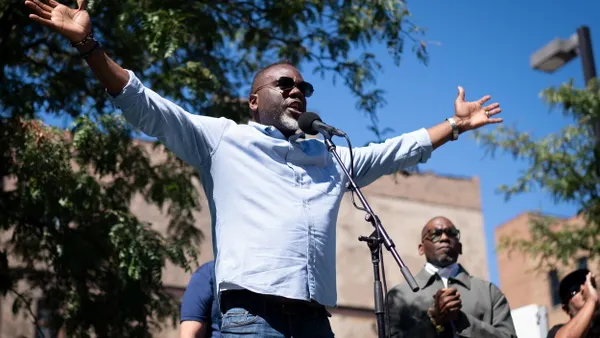Dive Brief:
- Mayors nationwide are sounding the alarm about inevitable budget cuts forced by the COVID-19 pandemic, and are showing widespread pessimism about the long-term impacts of the crisis, according to the annual Menino Survey of Mayors. The survey collected responses from 130 U.S. mayors in cities with populations over 75,000.
- Forty-five percent of mayors expect to see dramatic budget cuts for education as municipalities try to plug financial gaps, while at least one-third expect to see drastic cuts in parks and recreation, mass transit and roads, according to the survey. Ninety percent also expect the remote work trend to continue — which could make downtowns less appealing and vibrant — while around 80% expect that existing racial health disparities in cities will continue.
- Most survey respondents are also pessimistic about the long-term recovery of small businesses in their cities, with only 36% of mayors expecting to see a replacement of the businesses that shuttered due to COVID-19. Mayors overwhelmingly said that federal aid through the CARES Act was insufficient and did not address their cities' needs. In the absence of further federal help, mayors said they will look to new grant and loan programs and regulatory relief in a bid to protect vulnerable small businesses.
Dive Insight:
Those behind the Menino survey said they were struck by the notes of pessimism coming out of city halls across the U.S. in the wake of the COVID-19 crisis. Mayors are traditionally the top cheerleaders for their cities' futures, but this survey represents a marked shift, said Graham Wilson, director of Boston University’s Initiative on Cities and report co-author.
"In general, they're almost by definition boosters of cities, they wave the flag, tell everybody what a great city they have," Wilson said. "This year, we were very struck by this degree of concern and pessimism, which is not so typical of mayors."
The impacts on small business and education could be tremendous, those surveyed warned, with around 66% saying they expect minority residents and renters to still be experiencing "a lot" of economic harm next summer. And the fact that many mayors do not expect small businesses to be quickly replaced means they are expecting a "dramatic upheaval" in the economic landscape, the survey authors wrote.
Experts have warned that cities will not just be harmed economically by the pandemic, but also culturally if their small business and arts communities are hollowed out by the crisis.
In a bid to mitigate economic impacts, the majority of those surveyed by Menino say they favor further federal relief, though there's been no additional aid since the passage of the CARES Act in late March. House Democrats this week agreed to compromise on a $908 billion bipartisan stimulus plan — with $228 billion in funding for small businesses, $45 billion for transportation agencies and $82 billion for education — yet that plan faces "long odds" as it continues to spark Congressional debate, the Washington Post reports.
As cities look to plug enormous budgetary gaps, Wilson said they will continue to lean on Congress for assistance, especially as state governments face their own fiscal headwinds.
"There's a degree of alarm that we don't usually see with mayors," Wilson said. "And of course, this is what propels them to ask with great urgency for more help from Washington."
These concerns were echoed in another recent survey from the National League of Cities (NLC), which found that municipal revenues are down 21% while expenses have increased 17% amid the pandemic. Of those surveyed by NLC, 71% believe their government's condition will worsen if Congress does not pass another aid bill. The league had previously led calls for $250 billion in flexible aid for cities.
While some local leaders have spoken of the opportunities for a post-COVID recovery that would alleviate issues around transportation, connectivity, climate change and other challenges, the Menino survey noted that mayors are also concerned about the effects of widespread remote work, especially if employers shift away from owning or renting offices. That could have a knock-on effect, Wilson warned, which perhaps is being underestimated even now by city leaders.
"We wonder whether cities will have a full return to people going into work five days a week, in expensive office buildings downtown," Wilson said. "If that doesn't come back, and most people suggest that it's not going to come back at least fully, there continues to have a big impact on shops and restaurants in cities. Maybe mayors are not fully cognizant of, of how much damage this might do to central cities."













